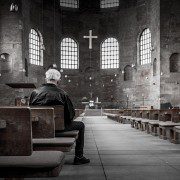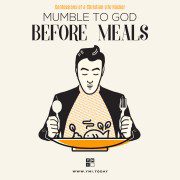Why I Started Going Back to Church
Written by Mackenzie King, Australia
“I just want to feel safe in a church environment again,” I said as a stranger beside me (who is now a good friend) squeezed my fingers. And to my horror, tears started leaking down my face.
This was about a year ago, when I was at a weekend getaway as part of my new church’s discipleship program.
After spending the weekend playing games, eating camp food, and learning about the basics of evangelism, we were asked to share how we hope to apply what we had learnt. While the others talked about wanting to share the gospel with a relative, give a long-lost friend a call, and “dig into the Bible more”, I wondered what “good, textbook” answer I could give. But when my turn came, I found myself telling everyone how much I had dreaded this weekend.
I quit my old church in the middle of 2020, after a series of hurts left me jaded and very tired of organised religion. Hearing words like “community”, “vulnerable”, and “journeying together” made me flinch, like I had developed an allergic reaction. I felt that their words didn’t match up with their actions, and they were unwilling to address the issues that led to the hurts.
I couldn’t bring myself to go back to church and pretend everything was all good. So I told my then-pastor that I was leaving. She said she was sorry to hear that I had been hurt and for everything that had happened, and it’s not what a community should look like.
Slowly picking up the pieces
The first weeks and months without church were the most freeing period I had experienced. I spent many lovely Sundays at the pools or going to the mall.
However, these activities soon felt empty and meaningless once the endorphins wore off. Despite feeling jaded about church, I missed sermons and worship–I missed just being in God’s presence. I wanted to sit at my Father’s feet, to have His love wash over me afresh and anew, and hear Him say, “There, there, child, you have been hurt, but I can make it work again”. I needed to know in my heart that He mends our wounds (Psalm 147:3) and in Him, there’s hope for a better future.
I knew that ironically this meant I had to open myself to the idea of finding a new church.
When my sister told me about her friend’s church, I was reluctant to try at first, because I didn’t want to be in a church where I knew someone. Still, that church had a particular appeal because their Sunday services are held inside a big cinema–which I thought was perfect for slipping in and out without having to do any small talk.
So, one Sunday, I did just that.
After a few months of being a wallpaper, I began to feel like if I wanted God to do something new in my life, I should get to know this church and its people a bit more. So I hesitantly signed up for a new life group and joined their social activities.
I was genuinely impressed by how everyone in the life group really participated in the discussions and how they all showed up in the social gatherings with merriment and gusto. It was refreshing and different from what I had experienced before.
But that still wasn’t enough for me. I figured that anyone can share reflections during Bible study and have fun together, but would these people really walk with one another when hardships come? Is there accountability among the members, and what about gossip?
I thought it would help to chat with the leader first, tell her about my experience, and learn if there are steps to hold someone accountable. Thankfully her answer was reassuring; she said that if there were any troubles or concerns within the group, we can tell her about it and it will be addressed.
After that, I realised that if I wanted to really connect with this new church, I would have to first put to death my presumption that hurt is just around the corner.
Working through my prejudices
First, I had to work with my psychologist to try to put to rest my presumptions. She told me that our brain compartmentalises information–it’s how we process and understand all the stuff we face every day–and what had happened was my brain had tucked away a “file” of my experience of hurt for “future reference”.
As I mulled over this, it dawned on me that we often think we’re “protecting” ourselves when we stay away from a certain situation, but sometimes we hurt ourselves more by not going out and re-experiencing things. Not to trivialise any hurtful experience, but my rationale was: “If I happened to drink bad coffee at one shop, it doesn’t mean coffees at other shops will all be terrible because they’ll be made by a different set of staff and with different coffee beans.” But if I kept holding onto that one bad cup, I would never get to taste delicious coffee again.
So I had to break down these “files” in my head by challenging them (“Is it true this will happen every time?”, “What evidence have I got for or against it?”). And to gather more information that would help me properly gauge my thoughts, I had to put myself out there by being more involved in my church.
Sometimes, healing happens only when we wade out into the uncertain future with God next to us—knowing that He provides new mercies every morning (Lamentations 3:22-23) and that He gives us “crowns of beauty instead of ashes, the oil of joy instead of mourning, and a garment of praise, instead of a spirit of despair” (Isaiah 61:3). God has the power to rewrite our stories and use our heartaches for His glory, but we will have to first step out with Him as our guide.
And sure enough, as I worked with God and dipped my toes into the life group, attended church regularly, and finally waded out into the ocean by joining my church’s discipleship programme, God began working to upend my presumptions.
He showed me there are sincere, genuine people in the church
I remember when I had to isolate for a week after a church weekend retreat because someone in the group had tested positive. When I told my life group (who were not part of the retreat) about my situation, texts of support came flooding in. “Let us know if you need anything”, and “We pray you’ll be all good”.
Words without action are dead (James 2:14-26), but I soon found out that they were people of words and action. When I messaged to say I needed a few bulbs of garlic and crumbed fish fillets for dinner, a friend showed up at my apartment with my requested groceries, plus a bonus bar of chocolate. I was blown away.
This was one small act of someone walking out her faith, and it was something I saw in different ways as I spent more time with the church. One of the church plants in a different area had attendees who were part of a community where addiction and poverty are rife. Every Sunday, the pastor opens the church doors for them, welcoming them in, handing them food and any aid they require. On another (more recent) occasion, a friend invited me to her place for Lunar New Year dinner when she remembered that my family wasn’t with me.
Whether it’s a few bulbs of garlic, being invited to dinner, or seeing how the pastor cares for his community, witnessing these acts of love was like seeing fresh grass grow over barren soil that was once parched and dry, and reminded me of Isaiah 43:19:
“See, I’m doing a new thing! Now it springs up, do you not perceive it? I am making a way in the wilderness and streams in the wasteland.”
I came to see that my year and a half of wandering in a barren wasteland can be and will be redeemed by God.
He showed me that I cannot look to humans as the perfect representation of Christ
One of the things I had to learn for myself was that humans are imperfect. Even though we’re called to be followers of Christ and to be like Him, we are still flawed creatures who fall short of the glory of God (Romans 3:23-24).
The only Perfect Person in all of this is God, who is able to forgive freely and call us back into the fold.
Instead of regularly sizing up others to know how “Christianly” (“perfect”) they actually were, I had to train my eyes on God, through prayer, worship, and reading His Word and teachings in the Bible and Christian books. Focusing on God allows me to recentre and remind myself, that firstly, I can love because He first loved me, and secondly, even when the love is not reciprocated, God sees all, and He has been there.
Finally, after a year of searching and taking tentative steps, I have found a new “home church”. As I look to cement myself a bit more in this new church by serving and spending time getting to know the people, my prayer is that no matter what future hurts come my way, I will remember to look to God, and know that a church is a place where broken people come to be healed and made whole.













Leave a Reply
Want to join the discussion?Feel free to contribute!